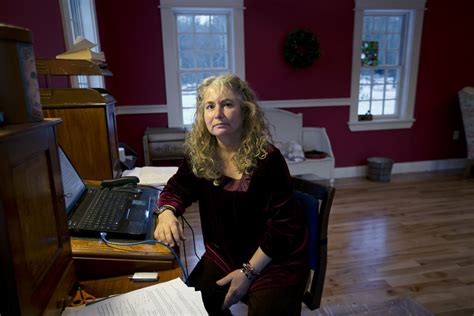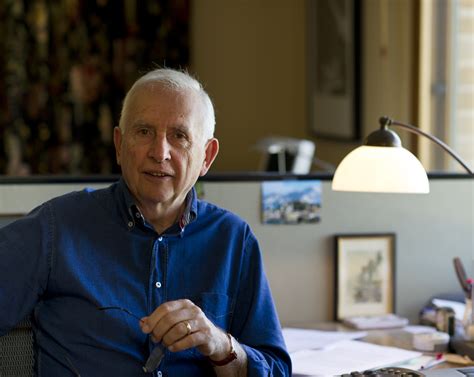A Quote by Lauren Slater
Sickness is the natural state in which we humans reside. We occasionally fall into brief brackets of health, only to return to our fevers, our infections, our rapid, minute mutations, which take us toward death even as they evolve us, as a species, into some ill-defined future.
Related Quotes
We study health, and we deliberate upon our meats and drink and air and exercises, and we hew and we polish every stone that goes to that building; and so our health is a long and regular work. But in a minute a cannon batters all, overthrows all, demolishes all; a sickness unprevented for all our diligence, unsuspected for all our curiosity, nay, undeserved, if we consider only disorder, summons us, seizes us, possesses us, destroys us in an instant.
We human beings are not only the beneficiaries but also the stewards of other creatures. Thanks to our bodies, God has joined us so closely to the world around us that we can feel the desertification of the soil almost as a physical ailment, and the extinction of a species as a painful disfigurement. Let us not leave in our wake a swatch of destruction and death which will affect our own lives and those of future generations.
We exist only by virtue of what we possess, we possess only what is really present to us, and many of our memories, our moods, our ideas sail away on a voyage of their own until they are lost to sight! Then we can no longer take them into account in the total which is our personality. But they know of secret paths by which to return to us.
Clearly, we are a species that is well connected to other species. Whether or not we evolve from them, we are certainly very closely related to them. A series of mutations could change us into all kinds of intermediate species. Whether or not those intermediate species are provably in the past, they could easily be in our future.
The storyteller is deep inside everyone of us. The story-maker is always with us. Let us suppose our world is attacked by war, by the horrors that we all of us easily imagine. Let us suppose floods wash through our cities, the seas rise . . . but the storyteller will be there, for it is our imaginations which shape us, keep us, create us - for good and for ill. It is our stories that will recreate us, when we are torn, hurt, even destroyed. It is the storyteller, the dream-maker, the myth-maker, that is our phoenix, that represents us at our best, and at our most creative.
As a survival-happy species, our successes are calculated in the number of years we have extended our lives, with the reduction of suffering being only incidental to this aim. To stay alive under almost any circumstances is a sickness with us. Nothing could be more unhealthy than to “watch one’s health” as a means of stalling death. The lengths we will go as procrastinators of that last gasp only demonstrate a morbid dread of that event. By contrast, our fear of suffering is deficient.
The future of life on earth depends on our ability to take action. Many individuals are doing what they can, but real success can only come if there's a change in our societies and our economics and in our politics. I've been lucky in my lifetime to see some of the greatest spectacles that the natural world has to offer. Surely we have a responsibility to leave for future generations a planet that is healthy, inhabitable by all species
One of the most important responsibilities of leaders in any setting - including business organisations - is to tell us our own story; to explain us to ourselves; to help us weave some meaning and purpose into the fabric of our lives; to illuminate our understanding of where we have come from; to paint word pictures of our future onto which we can project our aspirations.
God might grant us riches, honours, life, and even health, to our own hurt; for every thing that is pleasing to us is not always good for us. If he sends us death, or an increase of sickness, instead of a cure, Vvrga tua et baculus, tuus ipsa me consolata sunt. "Thy rod and thy staff have comforted me," he does it by the rule of his providence, which better and more certainly discerns what is proper for us than we can do; and we ought to take it in good part, as coming from a wise and most friendly hand.
When we hate our enemies, we are giving them power over us: power over our sleep, our appetites, our blood pressure, our health and our happiness. Our enemies would dance with joy if only they knew how they were worrying us, lacerating us, and getting even with us! Our hate is not hurting them at al, but our hate is turning our days and nights into a hellish turmoil.
The only things in which we can be said to have any property are our actions. Our thoughts may be bad, yet produce no poison; they may be good, yet produce no fruit. Our riches may be taken away by misfortune, our reputation by malice, our spirits by calamity, our health by disease, our friends by death. But our actions must follow us beyond the grave; with respect to them alone, we cannot say that we shall carry nothing with us when we die, neither that we shall go naked out of the world.
It's my firm conclusion that human meaning comes from humans, not from a supernatural source. After we die, our hopes for an afterlife reside in the social networks that we influenced while we were alive. If we influence people in a positive way -- even if our social web is only as big as our nuclear family -- others will want to emulate us and pass on our ideas, manners, and lifestyle to future generations. This is more than enough motivation for me to do good things in my life and teach my children to do the same.
He comes to us in the brokenness of our health, in the shipwreck of our family lives, in the loss of all possible peace of mind, even in the very thick of our sins. He saves us in our disasters, not from them. He emphatically does not promise to meet only the odd winner of the self-improvement lottery. He meets us all in our endless and inescapable losing.






































